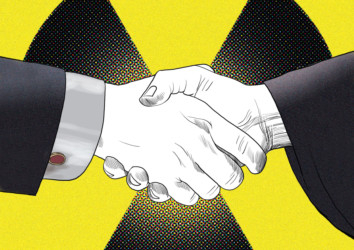
Following 19 rounds of multilateral negotiations extending more than a decade, Iran and the western powers (US, Britain, France, Russia, China + Germany) concluded a preliminary agreement to resolve the Iranian nuclear crisis on November 24 in Geneva. The Geneva agreement aims to ensure the peaceful nature of the Iranian nuclear programme and Tehran has accordingly pledged to freeze uranium enrichment activities over 5 per cent during the six-month period of the agreement. Iran has also agreed to stop building the Arak reactor, which operates with heavy water and produces plutonium, and halt any development of its nuclear fuel production facilities in Natanz and Fordo. The agreement also ensures that Tehran will accept increased international inspection of its nuclear activity and provide the International Atomic Energy Agency (IAEA) with specific information on the designs of its nuclear programme.
Iranian President Hassan Rouhani and his nuclear negotiations team strove to present the agreement at home as a major accomplishment; wherein it in fact constitutes a complete surrender. Indeed, the US administration has agreed to grant Iran important symbolic gains so that it enables Rouhani to silence his domestic critics who question the feasibility of his conciliatory approach with the West. Hence, the agreement, even if it does not expressly grant Iran the right to enrich uranium, nevertheless enables Rouhani to claim that this deal acknowledges Iran’s right to enrichment because it stipulates that Iran must cease enrichment activities over 5 per cent.
Yet, the right to 5 per cent uranium enrichment is already guaranteed by the 1969 Nuclear Non-Proliferation Treaty and the charter of the International Atomic Energy Agency (IAEA). Otherwise, the terms of the agreement show how desperate Iran was to reach a settlement, even if a temporary one, that would open a niche in the wall of international isolation, blockades and sanctions. Thus, huge concessions in exchange for minor economic gains offered by the West — some were unthinkable even in the recent past — were made. Iran’s agreement to rein in its nuclear activities in such an expansive way indicates that the Rouhani administration backed by former president Ali Akbar Hashemi Rafsanjani, with clear support from the Supreme Leader Ali Khamenei, has reached the conclusion that without compromise the country faces stark choice as Rafsanjani put it: “War or complete surrender.”
It may also be the case that Iran has signed an agreement that it may find difficult not to honour, because any breach of the agreement will weaken its international standing, as well as its position among its allies since Russia and China are signatories and guarantors of the agreement. In this eventuality, the United Nations Security Council will almost automatically issue new resolutions that will impose harsher sanctions on Iran.
Finally, even if Iran decides not to extend the agreement at the end of the six month period, the IAEA will have obtained information regarding Iran’s nuclear programme during its inspection, in addition to the information Iran has pledged to provide. This information will give the international community a better understanding of the scope and extent of Iran’s nuclear programme, making it quite difficult henceforth for Iran to hide sensitive aspects of its nuclear programme.
Scope for greater success
According to reformers, the agreement rescues the country from an inevitable economic collapse and strengthens the position of the Barack Obama administration vis-a-vis the hawks of the US Congress who seem intent to impose even harsher economic sanctions on Iran. In addition, Rouhani knows quite well that he will not be able to pursue his social and economic agenda unless the sanctions are lifted and Iran’s foreign relations are improved. From this point of view, the agreement represents a success upon which greater success — lifting all political and economic sanctions — can be built. However, this also means that greater concessions will have to be made in order to transform the six-month agreement into a permanent one, so that Iran can be reintegrated into the international community. In the long run, these concessions will eventually result in the erosion of the ideological, religious and political legitimacy of Iranian totalitarianism, represented by the Velayat-e-faqih concept — Guardianship of the Islamic Jurists. Ultimately, this is what the reformers in Iran hope for along with those in the region who have suffered most from Iranian policies.
Dr Marwan Kabalan is the dean of the Faculty of International Relations and Diplomacy at the University of Kalamoon, Damascus.










